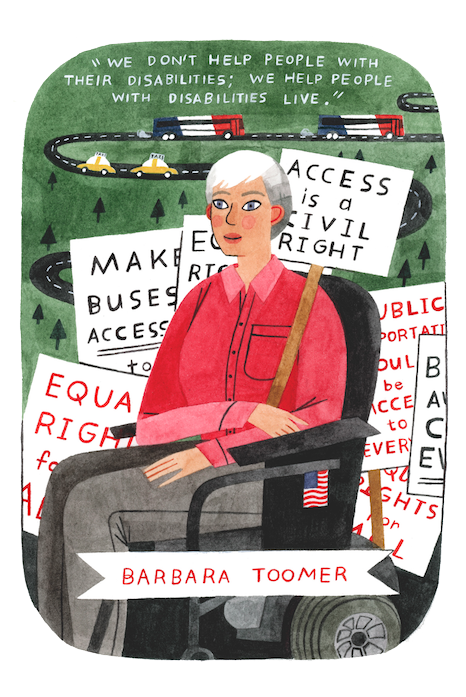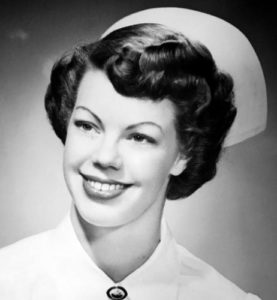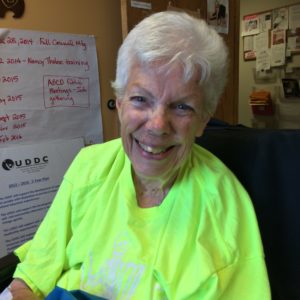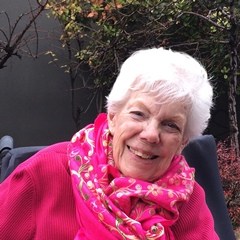
Additional Resources
Barbara G. Toomer,
A powerhouse in the disability rights movement
1929-2018
“We don’t help people live with their disabilities; we help people with disabilities live.”
by Rickie Crandall
Program Specialist, Utah Developmental Disabilities Council

Barbara Greenlee as a nurse in the United States Army Nurse Corps.
Barbara Greenlee was born and raised in California, where she graduated from nursing school and became a first lieutenant in the United States Army Nurse Corps. She married Captain Gerald Ross Toomer in 1953 in Fort Bragg, North Carolina, and later relocated to Utah. Shortly after the birth of their first child in 1956, Barbara contracted polio and lost the use of her legs. Although confined to a wheelchair for the rest of her life, she refused to slow down. Her husband engineered multiple contraptions to keep her mobile, allowing her to maintain her independence and raise her three children. Undeterred by her physical limitations, Barbara Toomer devoted over forty years as one of the leading disability rights advocates in Utah.
Barbara had been going against the grain since childhood. Later in life, she recalled the impact of her father’s disdain for President Franklin D. Roosevelt’s politics and disability. After arguing with her father about her support of her college professor who refused to sign a loyalty oath under the McCarthy era, she stated, “Basically, at that point, I decided there’s something wrong somewhere, that there was discrimination going on.”[1] This belief became even more evident during her time in the hospital after contracting polio. Both her father and a very good friend refused to see her because they could not handle seeing her that way. That was when she started to understand that she was no longer welcome in certain places.
 Nearly two decades later, Barbara began her activism on behalf of those with disabilities. She co-founded the Utah Independent Living Center in 1981 and took part in organizing Advocates for Utah Handicapped. Two years later, Barbara became involved with Americans Disabled for Accessible Public Transit (ADAPT) where she organized and participated in non-violent public protests. She organized “crawl-ons” demanding that the Utah Transit Authority (UTA) make its buses accessible to those with disabilities. The protests shut down every bus route in Salt Lake City when protesters chained themselves to the buses. She was jailed at least 35 times due to her activism, yet she never backed down.
Nearly two decades later, Barbara began her activism on behalf of those with disabilities. She co-founded the Utah Independent Living Center in 1981 and took part in organizing Advocates for Utah Handicapped. Two years later, Barbara became involved with Americans Disabled for Accessible Public Transit (ADAPT) where she organized and participated in non-violent public protests. She organized “crawl-ons” demanding that the Utah Transit Authority (UTA) make its buses accessible to those with disabilities. The protests shut down every bus route in Salt Lake City when protesters chained themselves to the buses. She was jailed at least 35 times due to her activism, yet she never backed down.
In 1991, Barbara helped to organize the Disabled Rights Action Committee, which continues to focus on public policy causes. She fought the UTA over steep fare hikes for paratransit, served as a plaintiff against local cab companies for not being ADA-compliant, and lobbied for Medicaid expansion. She was the only known Utahn to actively participate in the rallies and protests in Washington D.C. that led to the passage of the Americans with Disability Act. She was active in the disability rights movement through 2017 and was among the throngs of activists who attended a U.S. Senate committee hearing on the repeal of the Affordable Care Act. In the years prior to her death on April 24, 2018, she focused particularly on independent living, allowing people with disabilities to live at home versus being institutionalized.

Barbara Toomer in 2016.
Barbara was a powerhouse in the disability rights movement. Her accolades include: the National Organization for Women’s Woman of Courageous Action Lifetime Achievement Award in 2000, the Utah Issues’ Joe Duke Rosati Hell Raiser Award in 2005, the Advocate of the Year Community Justice Award from the Disability Law Center, the Martin Luther King Jr. Drum Major Award in 2008, the AARP Outstanding Volunteer in 2014, the Crossroads Urban Center Lifetime Achievement Award in 2015, and the Rosa Parks Award from the Salt Lake Branch of the NAACP in 2017. Because of her empowering activism for legal protections and public accommodations, people with disabilities in Utah can now participate more fully in their communities.
Rickie Crandall is the Program Support Specialist at the Utah Developmental Disabilities Council.
Footnotes
[1] Fred Pelka, What We Have Done: An Oral History of the Disability Rights Movement, (Univ. of Mass.: 2012), 385.

